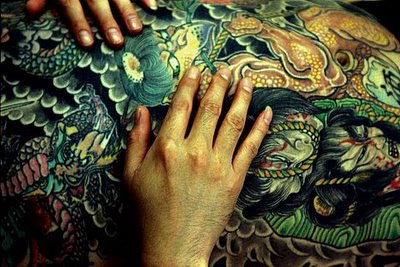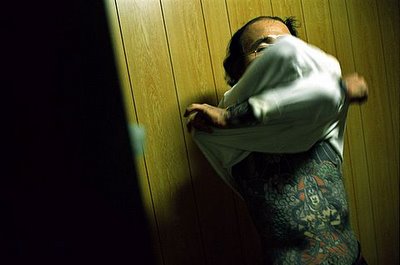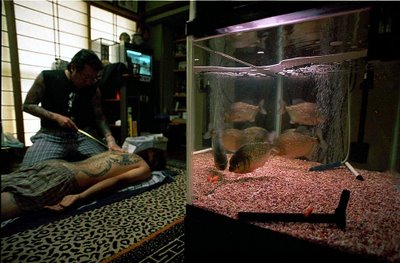"Very bad people," he said to me, eyes bulging out of his head as we waited outside an apartment for Horikoi "tattoo master". "They kill you, they kill you!"
"Where do I put out this cigarette Taijji," I asked and Taijji almost shrieked, though it sounded like a very hoarse whisper "Eat it! eat it!," message being, do not litter in a Yakuza building.
Horimono tattoo, the identifying mark of anyone belonging to the yakuza or of anyone who wants you to believe the same. A practice once banned by the Japanese government.
Historically, The Meiji Restoration of 1868 marked the start of Japan's advent into the "modern" world. Japan's goal was to become the “equal” of the Americans and British. Feudal systems were abolished and Japan attempted to absorb western culture, with the Japanese adopting western clothing, manners and education. As part of this “restoration,” in 1872 the government banned tattooing which was regarded as a sign of barbarism.
The yakuza are Japanese organized crime with a lineage going back some 300 years. They call their tattoo art “horimono” which means (surprise) tattoo in Japanese. The ancestors of the modern yakuza used tattoo as a mark of status. Different Yakuza gangs have different tattoos signifying which clan they belong to.
Horikoi and his "gang" of friends
Mr. Kimura on his way home from work
Mr. Kimura took us to his friends house for an interview. He seemed a sad and very complicated man. Mixed in with his conventional tattooes were flowers, disney characters and Hindu gods.
He gave me a gift when i left, a small plastic figurine of a man. Looking back, I wish i had time to speak with him after the interview.We drove off and left him standing under a streetlamp sans makeup, waving. He didnt seem to have many friends and I wondered if he talked to his tattoos.
The Yakuza see themselves as rebels (Horikoi had a large poster of James Dean on his wall) and seem to admire Samurai ideals (excluding of course murder, drug dealing and extortion).
While I was in Nagoya I noticed the extraordinary treatment Horikoi got at restaurants. The waiters seemed petrified and though Horikoi insisted that he was just a tattoo master, I have my doubts. A lot of his clients were members of the yakuza and we were not allowed to shoot their faces.
Bad boys bad boys...
Horikois piranahas watch him at work
To be tattooed in Japan is to suggest that you have abandoned society and turned your back on the rules. To be tattooed is to be looked at with “different eyes”. Its not easy to get a job if you are tattooed, but you get to belong to a club of sorts of "rebels" that include the Yakuza.

Though the tradition seems to be dying out Horikoi keeps it alive by tattooing the bodies of various Yakuza members and horimono afficianados. The choice to get a tattoo is a big one as once you are tattooed in Japan, people assume that you have turned to the dark side.
Getting a horimono tattoo is a very painful process and takes months, sometimes years to complete. The tattoo is done by hand with a long paint brush type instrument with needles instead of pork bristles.
Each tattoo is unique and incredibly expensive. For many, the horimono tattoos are proof of strength, courage, and solidarity.
I left Nagoya, plastic wrapped everything, regimentation, constant bowing, Horikoi, several scary men with missing fingers who insisted on feeding me sushi and one terrified fixer and returned to Bangalore. Some weeks later I mailed Horikoi these pictures you see. They never got to him and I imagine Mr. Rajshekar, the local postmaster poring over pictures of semi naked Japanese men maybe under a streetlight.
A month or so later, Taijii called. He sounded upset and his voice trembled. "Ryan, send the pictures, please. These people, they kill you they kill you they kill you."
I sent them.
















0 comments:
Post a Comment